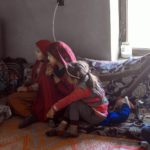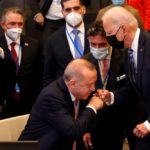A minor military clash that took place on June 5 between the Peshmerga — the military forces of the Kurdistan Regional Government (KRG) in Iraq — and the fighters of the outlawed Kurdistan Workers’ Party (PKK) is sparking debate on whether various Kurdish independence movements may harm each other.
The clashes took place in Amedi, a small town in the Duhok province of Northern Iraq where the Iraqi army, the Peshmerga, the Turkish army, the Iran-supported Popular Mobilization Units and the PKK are active.
Amedi is 15-20 kilometers away from the Turkish-Iraqi border as the crow flies. The reason for Turkey’s military presence in the Iraqi territory goes back decades. During a fierce battle in 1997 between Masoud Barzani’s Kurdistan Democratic Party and Jalal Talabani’s Patriotic Union of Kurdistan, Turkey cooperated with Barzani and Saddam Hussein against Iran-backed Talabani. This cooperation allowed Turkey to establish a military presence in Iraq. This presence is still maintained, and Turkey is using it to fight PKK combatants on Iraqi territory.
Turkey wants to control the area because it is on the route of the PKK fighters between their main base in the Qandil mountains and another PKK concentration in Sinjar.
The Defense Ministry of the KRG tweeted that five Peshmerga were ambushed and killed by PKK forces, while another four were injured. The PKK, for its part, said it does not want the Peshmerga to enter the area of confrontation between them and Turkish soldiers and that this was the reason for the incident.
One of the reasons as to why such a clash would take place between two entities that otherwise defend the same Kurdish cause lies in the different ways Kurdish activism evolved across the four countries with sizeable Kurdish minorities: Turkey, Iraq, Syria and Iran.
We may witness a variety of solutions for the promotion of the Kurdish cause adjusted to the reality of the countries where there are Kurdish independence movements.
Yasar Yakıs
In Turkey, Kurdish activists in 1978 set up the PKK. Its name took inspiration from communist ideology, was motivated by Pan-Kurdish ideals and aimed to unite the Kurds of all countries. As time passed, however, it became clear that a movement aimed at meeting the expectations of all Kurds was not realistic. So, the Kurdish movement in each country went its own way.
Although Turkey’s Kurds were leading the Pan-Kurdish movement, the most concrete progress was achieved in Iraq. As a result of Saddam’s harsh repression of Kurds and the protection provided by the US, which declared a no-fly zone in the north of Iraq, Iraqi Kurds were able to consolidate their autonomy in the north of the country and in 2017 went as far as organizing a referendum to proclaim their independence. More than 92 percent of voters supported independence, but the KRG refrained from proclaiming it because of then-prevailing international circumstances. Therefore, the Kurdish cause in Iraq is ahead of similar movements in other countries, but it does not aim at a Pan-Kurdish target.
The KRG’s declared aim is to transform the tribal nature of Kurdish society in Iraq into a state underscored by liberal national principles, while the PKK’s approach continues to be Pan-Kurdish but is based on decentralized cantons to manage cities within a wider state.
As a result of this and many other differences, the two Kurdish movements — the KRG and the PKK — came to the point of killing each other’s soldiers on June 5.
In Syria, the Kurdish cause followed a different path. When Syrian President Bashar Assad was faced with a real threat to his survival, he made an implicit agreement with Kurds in the northeast of the country; granted citizenship to many Kurds who were stripped of citizenship in 1962; withdrew his soldiers from the region; and acquiesced to a more or less cantonal administration for them.
The Syrian Kurds did not distance themselves from the PKK, though they claim not to have institutional bonds with it. Even the US, which provides all sorts of support to Syrian Kurds, discretely admits that the strongest Kurdish political party in Syria, the Democratic Union Party, is nothing but the Syrian extension of the PKK.
In Iran, Kurdish separatism dates to the post-World War II era. Iranian Kurds in 1946 proclaimed independence under the name of the Republic of Mahabad, which lasted less than a year. Their political movement is not institutionally connected with Kurdish movements in Turkey, Iraq and Syria.
In the future, we may witness a variety of solutions for the promotion of the Kurdish cause adjusted to the reality of the countries where there are Kurdish independence movements.
We will have to wait to see whether the military clash in Amedi is a harbinger of similar future incidents or whether it will be forgotten.
By : Yasar Yakis – a former foreign minister of Turkey and founding member of the ruling AK Party. Twitter: @yakis_yasar
Source: Arab News



